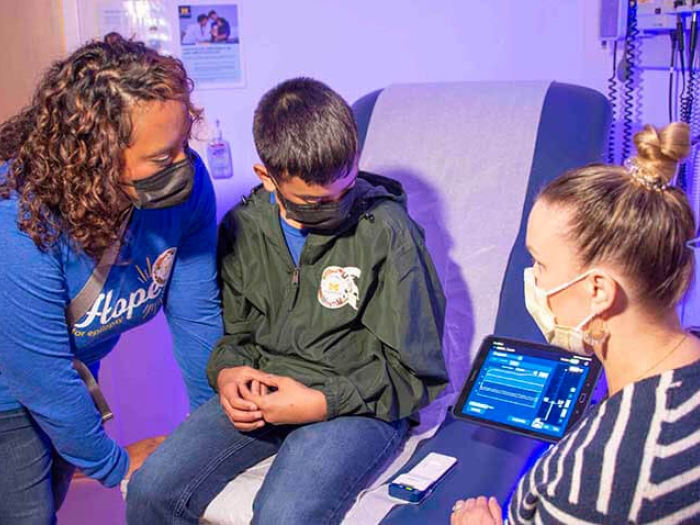A new C.S. Mott poll reflects the challenges parents face in finding child care or preschool. Here’s how to make the search easier and more effective.
7:00 AM
Author |

For parents of many newborns, choosing child care can be a daunting task.
Beyond costs and logistics, there's a lot families must factor into the decision.
MORE FROM MICHIGAN: Sign up for our weekly newsletter
"It's a tough challenge," says Andrew Hashikawa, M.D., an assistant professor of pediatric emergency medicine at the University of Michigan C.S. Mott Children's Hospital. "And it's more than a 'drop-off' location: Child care is an opportunity for children to develop, grow, learn and be ready for kindergarten."
The latest C.S. Mott Children's Hospital National Poll on Children's Health focused on these issues, identifying what matters most to parents selecting child care. The survey involved 2,051 parents with children ages 1 to 5 who attend a day care or preschool.
Building security, staff training and availability of educational and active play were among the top priorities.
Still, of those polled, nearly two-thirds cite difficulty finding child care with the characteristics they want. Only half are confident they could tell if a facility or provider is safe and healthy.

Hashikawa, who sits on the American Academy of Pediatrics Council on Early Childhood and focuses on early childhood education, offers his advice:
Tips for finding child care
Start early: Some families might not begin their search until a baby is born. That's often too late: "As soon as you're thinking about having a baby, you need to start the process," Hashikawa says. "A lot of the good child care centers have waitlists." That head start allows parents enough time to arrange visits and research a variety of options.
Check credentials: Although regulations and compliance vary by state, a licensed provider offers peace of mind that background checks and educational training are verified. "It really gives that stamp of approval," says Hashikawa. He suggests parents visit Child Care Aware for advice — and, to compare researched and rated options in Michigan, Great Start to Quality.
SEE ALSO: Kid with a Chronic Illness? 5 Tips for Parent-Teacher Teamwork
Make a surprise visit: An impromptu drop-in shows what the facility is like on a given day. Notes Hashikawa: "Look around to see how providers engage children — are they interacting and allowing them to play with toys, or are they sitting in front of a television?" Check, too, for cleanliness and a low adult-to-child ratio (1:4 for infants and 1:10 for older kids).
Study the curriculum: Brains of babies and young children develop rapidly from birth to age 5. "Health and nutrition and learning and stimulation are really important during that time," Hashikawa says. Ask about educational toys, open play, lesson plans and activities, outdoor space and mealtime structure. Accredited facilities should have these details readily available.
Know the vaccine policy: Although inoculations can be a contentious issue, most child care centers "are very pro-vaccine," Hashikawa says. "It helps protect staff, it helps prevent kids from getting sick more often and it protects vulnerable infants." Forty-one percent of Mott poll respondents would avoid care providers that allow unvaccinated children to attend.
Stress safety: More than half of those surveyed say a gun on the premises would be a deal breaker. That's unlikely in a child care center or preschool, but it's possible at an unlicensed at-home provider. Notes Hashikawa: "Parents should ask: Are there weapons on the premises? Are they locked up? Who else is coming and going?" Research crime rates of the area, too.

Explore a variety of health care news & stories by visiting the Health Lab home page for more articles.

Department of Communication at Michigan Medicine
Want top health & research news weekly? Sign up for Health Lab’s newsletters today!





